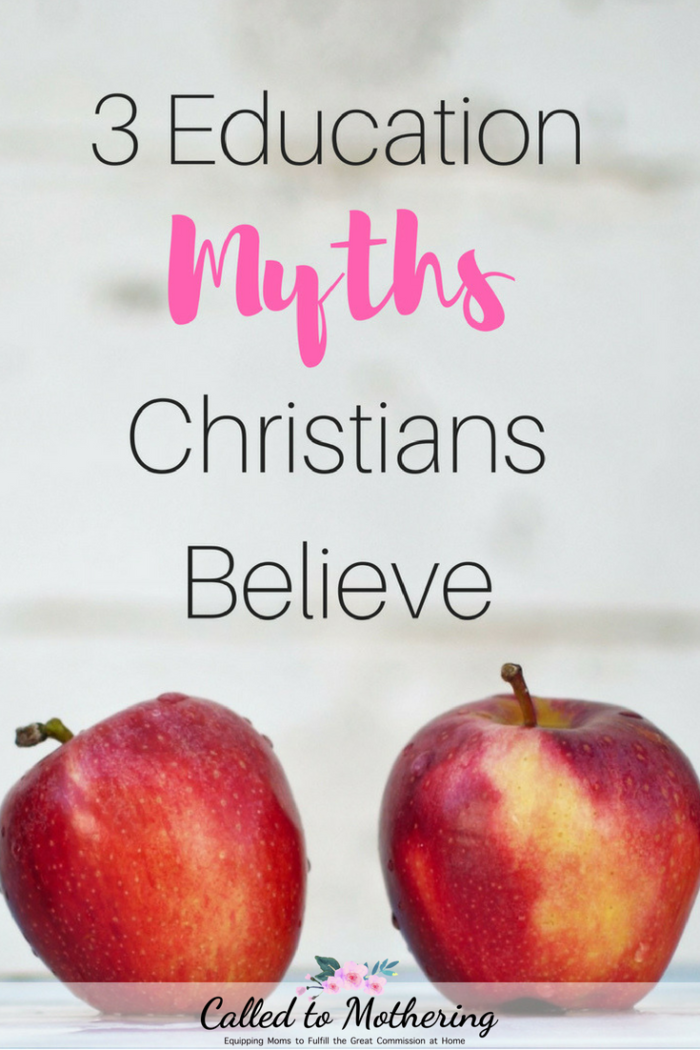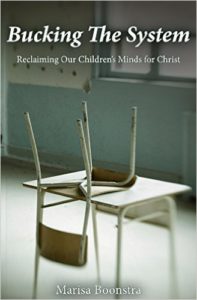Nobody wants to be accused of having weak faith. But there it was, staring me uncomfortably in the face.
In a conversation with someone, I had stated my belief that it’s not wise to put kids, whose worldview is still forming, into a place that teaches things contrary to God’s Word for 30 hours a week.
I thought this was a pretty reasonable conclusion to draw, given the current state of our nation’s education system. But then she asked me, “How small is your God?”
That one little question packed a pretty big punch. It suggested that I didn’t trust God with my children enough to put them in public school.
But, it also revealed a few myths about education that we’ve come to believe as Christians over the past several decades.

Myth #1: Choosing a Christian education indicates a response based on fear.
Sending your child to public school seems to be the litmus test for a believer’s faith these days. We’re told that yes, there is a risk of young kids being corrupted by worldly influences and apostasizing, but you just need to have faith that God will protect them nevertheless. Jesus is their Shepherd, after all.
Are those parents who educate at home and put their kids in private school only doing so out of fear, though? Do other moms, who send their children to public school knowing the risks, have more faith when it comes to parenting?
I don’t think so.
Wanting to protect my children from secular, worldly influences that will damage them spiritually, emotionally, and psychologically does not mean my faith in God is small.
I homeschool because as their mother, I have a responsibility to my kids to make sure they are grounded in the Truth. A curriculum that removes God and religion is one built on hollow and deceptive philosophies, pure and simple. And anything that raises itself up against the knowledge of God is a false religion (Exodus 20:5).
Why would I willingly subject my children to a system that would train them to view history, math, science, nature, art, literature, and music in this manner?
That doesn’t make me selfish or lacking in faith. It makes me a responsible steward of my children. Sometimes fear is a good thing. It warns us to stay away from certain dangers. A healthy fear isn’t motivated by a lack of trust in God; it’s motivated by a love for Him and a desire to follow His Word.
Faith also isn’t deliberately putting your children in harm’s way and hoping for the best, when God has already given us the principles we need to navigate this decision.
The people who say, “how small is your God?” are also the same ones who refuse to believe His provision for private school or homeschooling. “It’s too expensive”; “We can’t survive without two incomes”; or “I’m not equipped to homeschool” are common arguments against alternative forms of education.
Myth #2: The responsibility of educating children belongs to the government.
There’s an important concept within Reformed Christianity known as “sphere sovereignty”. It recognizes three primary spheres in this world— the family, the church, and the state. While these spheres certainly relate to one another, one does not have sovereignty over another. They each have different roles that should not be confused.
God has delegated the responsibility of civil justice and protection of freedoms to the government. To the church, He has given the responsibility of equipping the saints for ministry, providing for the needs of believers, and spiritual discipline. Finally, the responsibility of educating children is a task God has given to parents.
Parents have direct authority over their children (Exodus 20:12; Colossians 3:20) and are commanded to teach their children the ways of the Lord (Deuteronomy 6:7; Ephesians 6:4). Schools must be understood as an extension of parental authority.
Seeing as how God did not design the state to function like the church or family, it’s no surprise that its schools have been a total disaster. As a result, our government has weakened both the family and the church in America. Not only is church attendance decreasing among younger generations, but the family unit is in shambles.
Many parents neglect and abuse their power, yes. But it’s clear that the state poses a much greater danger in controlling education than leaving the task to imperfect parents. Bad parents can ruin their kids. But a bad government can ruin an entire nation.

Myth #3: The goal of education is to witness to others.
I hear many Christians use the salt & light argument in defense of sending kids to government schools. But there’s a fundamental flaw in this reasoning.
If we truly believe our kids can withstand the harmful ideas and influences of a secular school, why aren’t we willing to send them to, say, Muslim schools? Don’t those children need the light of Jesus too?
The only difference is that those schools teach Islam, while the public schools teach the religion of Humanism.
How about moving to a low-income neighborhood and enrolling our kids in a school in an urban district? Surely, those kids growing up without fathers and surrounded by drugs & violence need to hear the Gospel as well.
But we don’t this, do we?
We stay in our comfortable, middle class communities with Blue Ribbon school districts and essentially say to ourselves, “While my child is getting a good education, he might as well shine the light of the Gospel to other students.”
Are we more concerned with the eternal souls of the lost, or our own personal peace and affluence? As long as it doesn’t require us to make much of a sacrifice financially or emotionally, we tend to get on board.
The goal of education is not to provide missionaries to unbelievers. The fundamental goal of education is to educate children through moral and intellectual instruction. Our concern should then be with what type of education our children are receiving.
Christian children are not ready to be missionaries. They need an education that trains and prepares them to live as God’s people in a secular culture. You don’t send soldiers into war before training, and you don’t send children to receive a secular education when they need to receive a Christian one.
Do I care about other people’s kids? Of course. Am I deeply concerned about their salvation? Absolutely.
But it’s not my job to “lend out” my children to the public school so they can evangelize other kids. They shouldn’t be sacrificed on the altar of relationship evangelism to do so.
For more on what the Bible says about education, check out


Marisa, I’ve noticed what a great blogger you are, and have nominated you for the Blogger Recognition Award! You can see my post here: http://gracetosoar.com/delayed-obedience/
Thanks for your ministry!
Wow, I am so honored that you nominated me! I’m continually amazed and overwhelmed by how God uses this blog to encourage, inspire, and challenge other moms for His glory. 🙂
Amen!!!! Oh my word, amen!!! Recently I got a comment from someone that she did not want her kids to be cloistered—and yet if you look at our family’s life, we are anything but—just our choices are intentional.
I thank the Lord that I don’t believe any of these myths. I believed a lie that I wasn’t good enough to teach my own kiddos (with the first two). I have stomped that in the ground and am now teaching my youngest.
That’s wonderful, Tami! I also believed that I wasn’t good enough to teach my children, even after we started homeschooling.
Quite convincing. My baby isn’t school-age yet but I’m saving this to my Pinterest!
Thanks for saving this for future reference, Sarah! 🙂
I just love anything you write on education and home schooling! #3 is so important to dispel! Thank you!
Awww thanks, Rebekah! #3 is so ingrained in our Christian culture that it’s hard to break free from. I really believe education has become an idol for many in the church.
This is a great post on education. #3 is vital. I’ve known many Christians who grew up in public school with a strong faith and a passion to witness to others, but I’ve also known many others who were influenced in a negative way. Some of those have since completely walked away from their Christian roots. While we like to say that X, Y, and Z impact which way a child goes, it’s really not true.
While I know this sounds like recommending homeschooling out of fear, I have to ask, “Is it really worth the gamble?”
Thanks Lauren! I’ve known faithful, committed Christians from both camps too. Some young people manage to graduate from public school with their faith intact, but their minds have been filled with all sorts of humanist thinking that they automatically default to without realizing. I accepted Christ at 18, and it’s taken me nearly as long to undo these kind of thoughts. You’re right that it’s not worth the gamble!
Such a great post! Yes, I want my children to evangelize and be a light to the world, but only after they’ve been properly equipped and formed. Where your child is schooled in the early plays an important role in this.
Thanks Audrey! It’s so important for them to have that solid biblical foundation when they’re younger so they can stand firm in our secular culture.
“Wanting to protect my children from secular, worldly influences that will damage them spiritually, emotionally, and psychologically does not mean my faith in God is small.” I agree with this so much! We plan to send our children to private school if/when we can afford it and like the schools around us and homeschool when we feel that’s the best fit given our options and our children’s personalities. When some of my friends ask what we are planning for schooling our toddler their response is often “Why would you want to shelter them?” “They’ll be so naive once they get out in the real world.” etc. But that’s such a narrow-minded approach to the purpose and function of private and home schooling.
I’ve never heard of sphere sovereignty but that’s an interesting perspective.
Right, the true purpose of private education isn’t to isolate kids from the rest of the world- it’s to prepare them to live in it! We originally started out with our son attending Christian school and then transitioned to homeschooling.